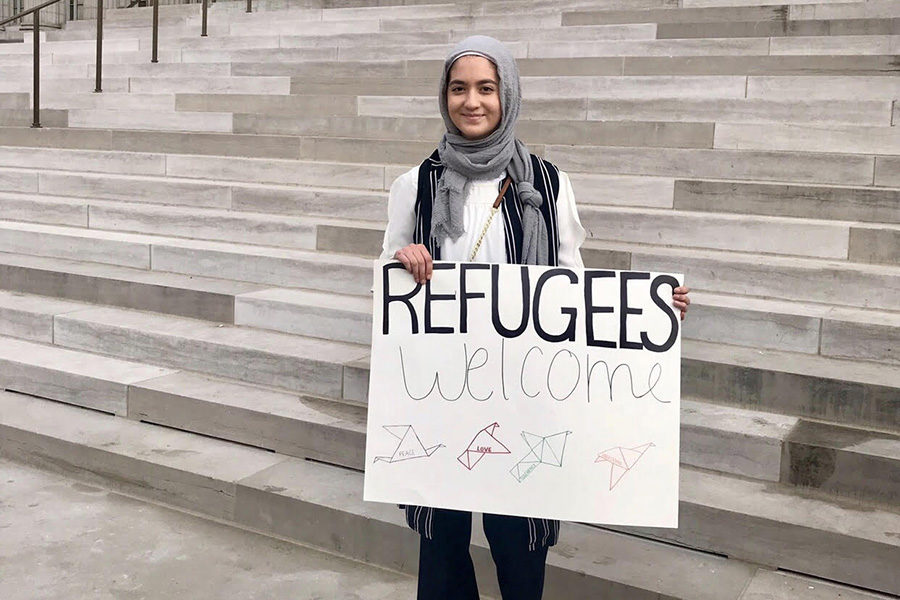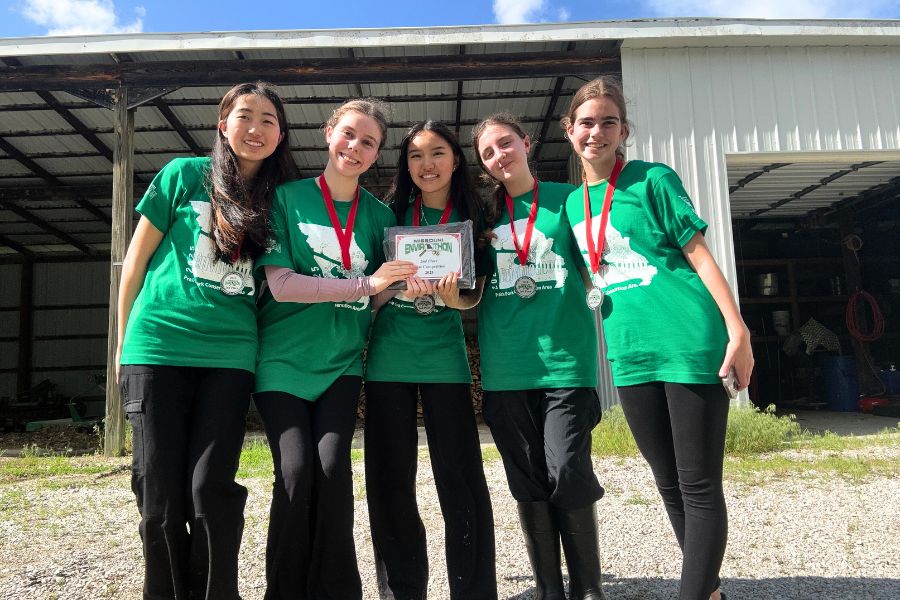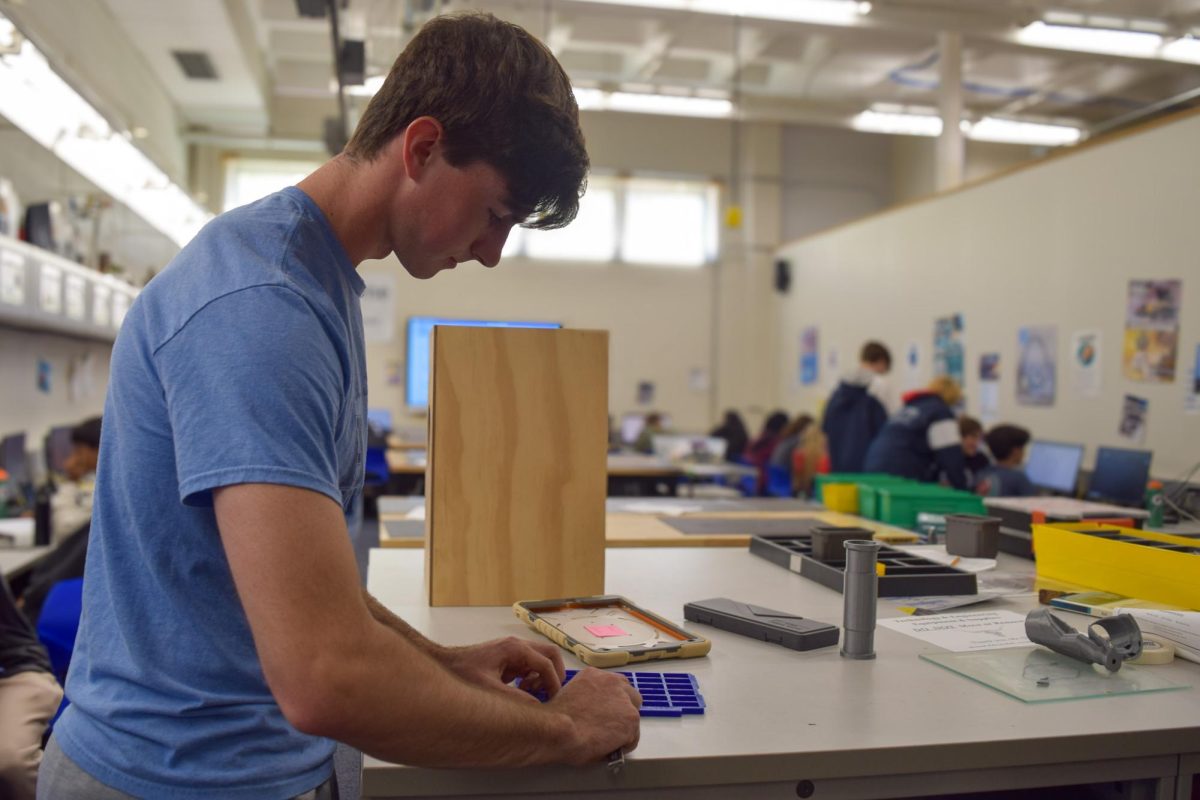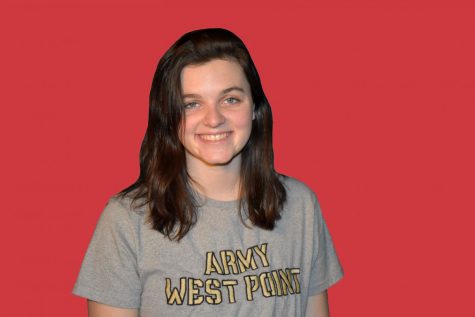With a new language, culture and lifestyle awaiting her in the United States, sophomore Ulaa Kuziez and her family immigrated from Damascus, Syria to Missouri when Kuziez was nine years old.
“I don’t remember the exact day that we decided to go, but my parents were thinking about our future and how they want us to live and prosper, and the best way for us to do that at that time was to come to the United States for the opportunities here,” Kuziez said. “When I first moved here, everything was so different, the language, the culture, the people, so I felt like a stranger and that was really frightening for 9-year-old me.”
Though learning English was one of the hardest transitions for Kuziez to make in moving to America, she is thankful for the guidance that she received from her elementary school teachers.
“I still speak Arabic at home, but a lot of people tell me that they’re surprised to hear me speak because my English is good,” Kuziez said. “I know that the only reason that I learned to speak this language so quickly was through the support of my teachers at Green Trails Elementary. I’m forever grateful for their support.”
Kuziez considers herself very fortunate to have had a smooth transition from Syria to the United States, but she knows that not every immigrant is as lucky as she is.
“The process for other people is extremely long and very difficult, but for me, my family had lived in the States back in the 90s, so they have US citizenship that they passed onto my sibling and me,” Kuziez said. “That made it a lot easier for us to come in, whereas my family members back in Syria have been trying to apply, but are unable to come in due to the policy that bans them from entering.”
Kuziez uses her frustrations regarding the struggles that her Syrian relatives face in their efforts to gain citizenship to inspire her fight for social justice.
“When the very country that accepted me for who I was a few years ago tries to impose policies that ban people who look like me from entering the country—that makes me upset, that makes me frustrated. That’s also part of the reason why I became interested in the fight for justice for all.”
While Kuziez fights for social justice regarding immigration, she is also passionate about racial issues on the home front. Kuziez believes that her hijab, the headscarf that she chooses to wear, is the reason she experiences prejudice when she is in public.
“Part of the reason I became passionate about social justice was because of my personal experience with prejudice ever since I started to put on the hijab. That has motivated me to be unapologetic, but also learn more and try to fight for justice,” Kuziez said. “It is tiring to wake up every day and try to prove that I belong and that I am part of this society. I have to brace myself for hateful attacks in all of my identities. I have to prove my Americanness. That shouldn’t have to be the case.”
In an effort to educate her community on racial prejudice, Kuziez is involved in programs like the Council of American and Islamic Relations (CAIR) and the Superintendent’s Social Justice Leadership Advisory Council (SSJLAC).
“With CAIR, a few high school students met with our elected representatives and we talked to them about issues that pertain to us as young people, but also as Muslim students. We wanted to show them that we care and we, as their constituents, belong here and we want to be involved in the process of making decisions for us,” Kuziez said. “SSJLAC meets with Dr. Marty and we use that conversation to push for change and to push for a more inclusive environment as well as more strict policy and zero tolerance towards racial discrimination in general.”
Kuziez considers school to be a fairly inclusive environment, but she is always looking for ways to increase knowledge and diversity.
“I know we all have biases, we all have misconceptions, including myself,” Kuziez said. “I want to challenge everyone to get out of their comfort zones, to read the facts, to talk to people who are different than them and try to understand the reality of people that they may have misconceptions about.”




![Focused on providing exceptional service, sophomore Darsh Mahapatra carefully cleans the door of a customer’s car. Mahapatra has always believed his customers deserve nothing less than the best. “[If] they’re trusting us with their car and our service, then I am convinced that they deserve our 100 percent effort and beyond,” Mahapatra said.](https://pwestpathfinder.com/wp-content/uploads/2025/10/DSC_0018-1200x800.jpg)
![Sophomore Aleix Pi de Cabanyes Navarro (left) finishes up a soccer game while junior Ava Muench (right) warms up for cross country practice. The two came to Parkway West High School as exchange students for the 2025-2026 school year. “The goal for the [exchange] program is to provide opportunities for both Parkway students and our international exchange students to learn about other cultures, build connections and become confident, capable, curious and caring — Parkway’s Four C’s — in the process,” Exchange Program Lead Lauren Farrelly said.](https://pwestpathfinder.com/wp-content/uploads/2025/10/Feature-Photo-1200x800.png)

![Gazing across the stage, sophomore Alexis Monteleone performs in the school theater. The Monteleone family’s band “Monte and the Machine” has been releasing music since 2012, but Alexis started her own solo career in 2024 with the release of her first single, Crying Skies. “My whole family is very musical, [and I especially] love writing [songs with them],” Monteleone said.](https://pwestpathfinder.com/wp-content/uploads/2025/09/DSC7463-1200x798.jpg)
![Amid teaching a lesson to her AP Calculus BC class, Kristin Judd jokes alongside her students in their funny remarks. Judd has always enjoyed keeping the mood light in her classroom, along with on the volleyball court. “[I enjoy] that side talk where you see [or] overhear a conversation and chime in, or somebody says something funny,” Judd said.](https://pwestpathfinder.com/wp-content/uploads/2025/09/image-1200x730.jpg)
![Eyeing the ball, junior Ella McNeal poses for her commitment pictures at Clemson University. McNeal’s commitment comes after months of contact with top Division 1 soccer programs. “ It has taken a lot to get to where I am, but I know that [what] I've already been through is just the beginning, and I can't wait for what is to come,” McNeal said.](https://pwestpathfinder.com/wp-content/uploads/2025/09/IMG_4926-1200x900.jpeg)


![Senior Adam Zerega stands with senior Dexter Brooks by farm equipment. Zerega often worked with friends and family on his farm. “I've been able to go to my family's farm since I was born. I [spend] at least three weekends a month [on the farm], so I'm there all the time,” Zerega said.](https://pwestpathfinder.com/wp-content/uploads/2025/04/IMG_4872-1200x900.jpg)

![After a thrilling point, senior Katie Byergo and junior Elle Lanferseick high-five each other on Oct. 8. With teamwork and camaraderie, Byergo worked together in the game against Lafayette High School. “[Byergo’s] is really positive with a good spirit,” Lanferseick said. “I set her [the ball] and she hits it [or] gets the kill.”](https://pwestpathfinder.com/wp-content/uploads/2025/10/DSC_9349-1-e1761159125735-1200x791.jpg)
![Leaning on the podium, superintendent Melissa Schneider speaks to Parkway journalism students during a press conference. Schneider joined Parkway in July after working in the Thompson School District in Colorado. “My plan [to bond with students] is to get things on my calendar as much as possible. For example, being in [classes] is very special to me. I am trying to be opportunistic [meeting] kids [and] being in [the school] buildings. I have all the sports schedules and the fine arts schedules on my calendar, so that when I'm available, I can get to them,” Schneider said.](https://pwestpathfinder.com/wp-content/uploads/2025/09/IMG_5425-1200x943.jpeg)

![Leaping through the air, senior Tyler Watts celebrates his first goal of the season, which put the Longhorns up 1-0 against the Lafayette Lancers. Watts decided to play soccer for West for his last year of high school and secured a spot on the varsity roster. “[Playing soccer for West] is something I had always dreamed of, but hadn’t really had a good opportunity to do until now. It’s [really] fun being out [on the field], and I’m glad I decided to join the team. It’s just all about having fun with the boys and enjoying what time we have left together,” Watts said.](https://pwestpathfinder.com/wp-content/uploads/2025/09/DSC_1951-1200x855.jpg)

![Shifting global trade, President Donald Trump’s tariffs are raising concerns about economic stability for the U.S. and other countries alike. “[The tariffs are] going to pose a distinct challenge to the U.S. economy and a challenge to the global economy on the whole because it's going to greatly upset who trades with who and where resources and products are going to come from,” social studies teacher Melvin Trotier said.](https://pwestpathfinder.com/wp-content/uploads/2025/05/MDB_3456-1200x800.jpg)

![Pitching the ball on Apr. 14, senior Henry Wild and his team play against Belleville East. Wild was named scholar athlete of the year by St. Louis Post-Dispatch after maintaining a high cumulative GPA and staying involved with athletics for all of high school. “It’s an amazing honor. I feel very blessed to have the opportunity to represent my school [and] what [it] stands for,” Wild said.](https://pwestpathfinder.com/wp-content/uploads/2025/05/unnamed-6-1200x714.jpg)
![Red, white and blue, the American flag holds the values of our democracy. The fight that we once endured has returned, as student journalists and senior correspondents across the country are losing their voices due to government control. “[Are] the White House and [the] government limiting free speech [and] freedom of the press? Yes [they are],” chief communications officer of the Parkway School District and former journalist Elisa Tomich said.](https://pwestpathfinder.com/wp-content/uploads/2025/03/Untitled-design-14.jpg)
![Freezing in their position, the Addams Family cast hits the “rigor mortis” pose after cast member and senior Jack Mullen, in character as Gomez Addams, calls out the stiff death move. For the past four months, the combined company of cast members, orchestra pit, crew and directors all worked to create the familial chemistry of the show. “I’m excited for [the audience] to see the numbers, the music, the scenes, but I also just love all the technical aspects of it. The whole spectacle, the costumes, makeup and the people that put in the work backstage in order to make the show successful on stage. I’m excited for people to see and appreciate that,” Mullen said.](https://pwestpathfinder.com/wp-content/uploads/2025/03/DSC0116-1200x800.jpg)
